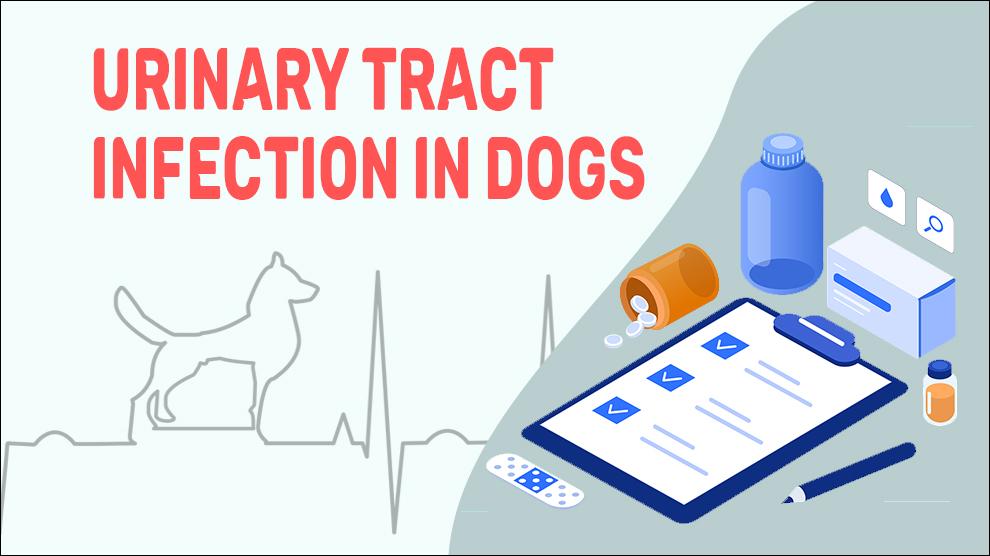What Is Urinary Tract Infection In Dogs?
Symptoms Of Urinary Tract Infection In Dogs
The most common symptom of a UTI in dogs is frequent urination. The dog may also experience pain or discomfort while urinating, which may cause them to cry or whimper.
Other symptoms of UTIs in dogs include:
- Blood in the urine
- Straining to urinate
- Lethargy or weakness
- Foul-smelling urine
- Licking the genital area excessively
- Loss of appetite
- Fever
If your dog is displaying any of these symptoms, it is essential to seek veterinary care promptly. UTIs can lead to serious complications, including bladder stones, kidney damage, or even sepsis if left untreated.
Treatment Options For Urinary Tract Infection In Dogs
Treatment for UTIs in dogs typically involves antibiotics to eliminate the bacterial infection. The type and duration of antibiotics prescribed will depend on the severity of the infection and the type of bacteria causing it.
In some cases, pain medications or anti-inflammatory drugs may also be prescribed to alleviate discomfort and inflammation in the urinary tract.
It's important to follow the veterinarian's instructions for administering medication and completing the full course of antibiotics.
Caution should be taken when giving antibiotics to dogs with UTIs, as overuse or misuse of antibiotics can lead to antibiotic resistance and make future infections more difficult to treat.
Probiotics and cranberry supplements can also be beneficial in preventing UTIs and maintaining a healthy urinary tract in dogs.
Home Remedies For Urinary Tract Infection In Dogs
There are several home remedies that can help to alleviate the symptoms of UTIs in dogs.
These include:
- Encourage your dog to drink more water. This will help to flush out the bacteria from the urinary tract.
- Add cranberry juice or cranberry supplements to your dog's diet. Cranberries contain compounds that can help to prevent bacteria from adhering to the urinary tract walls.
- Give your dog probiotics. Probiotics can help to restore the natural balance of bacteria in the gut, which can help to prevent UTIs.
- Give your dog herbal remedies. Herbs such as uva ursi, marshmallow root, and dandelion root can help to soothe the urinary tract and reduce inflammation.
It is important to note that while home remedies can be helpful, they should not be used as a substitute for veterinary care. If your dog is displaying symptoms of a UTI, it is important to seek veterinary attention promptly.
How To Prevent Urinary Tract Infection In Dogs?
There are several things that you can do to help prevent UTIs in dogs:
- Keep your dog clean and dry. Regular grooming and cleaning of the genital area can help to prevent the buildup of bacteria.
- Encourage your dog to drink plenty of water. This will help to flush out the urinary tract and prevent the buildup of bacteria.
- Don't hold your dog's urine for extended periods. This can lead to the buildup of bacteria in the urinary tract.
- Use high-quality dog food. A balanced and healthy diet can help to support your dog's immune system, which can help to prevent UTIs.
Affected Dog Breeds Of Urinary Tract Infection
UTIs can occur in any breed of dog, but some breeds may be more susceptible due to their anatomy or genetic predisposition.
Female dogs are generally more prone to UTIs due to the shorter length of their urethras, which makes it easier for bacteria to travel up into the bladder.
Breeds that are prone to developing UTIs include:
- Dachshunds
- Shih Tzus
- Pomeranians
- Bichon Frises
- Yorkshire Terriers
- Miniature Schnauzers
- Cavalier King Charles Spaniels
Causes For Urinary Tract Infection In Dogs
Causes:
UTIs in dogs can be caused by various factors including bacterial infections, urinary stones or crystals, and even cancer. It is commonly caused by bacteria, including E. coli, Proteus, Klebsiella, bladder stones, and cancer.
Bacteria can enter the urinary tract through the urethra or travel up from the bladder. Certain underlying medical conditions can also increase the risk of UTIs in dogs, such as diabetes, kidney disease, or a weakened immune system.
When To See A Vet For Urinary Tract Infection In Dogs?
It's important to seek veterinary care if you suspect that your dog has a UTI. Delaying treatment can lead to serious complications such as kidney damage or even sepsis.
If your dog is exhibiting any of the symptoms of a UTI, such as frequent urination or blood in the urine, contact your veterinarian immediately.
Food Suggestions For Urinary Tract Infection In Dogs
Feeding a balanced and healthy diet can help prevent UTIs in dogs by maintaining a healthy urinary tract.
It's important to provide plenty of fresh, clean water for your dog to encourage frequent urination and flush out any potential bacteria.
Feeding a diet that is high in moisture and low in carbohydrates can also help promote urinary tract health.
Conclusion
UTIs in dogs are common but can be easily treated with proper veterinary care and attention to preventative measures.
A balanced diet, plenty of fresh water, and regular veterinary check-ups can help maintain urinary tract health in dogs.
Owners should be aware of the symptoms of UTIs in dogs and seek prompt medical attention if they suspect an infection.
With proper treatment and preventative care, dogs with UTIs can quickly return to their happy and healthy selves.

















